
Objective:to explore the effects of Coelom continuous Circulatory Hyperthermia Perfusion(CCCHP)on vital signs and abdominal organs of experimental animals at different temperatures,in order to find out the optimal temperature for treatment and effective ways of temperature control.
Application methods:selection of experimental animals,dogs do body cavity heat circulation perfusion chemotherapy machine CCCHP animal model was established,with 41℃(divided into pure saline group and cisplatin group),42℃(saline group)and 43℃(saline group)abdominal cavity temperature on each group of animals CCCHP3(clinical treatment for a period of treatment),every time 1 h,2 d.Record the dog's vital signs,thermometer readings and panel data of the heat irrigation machine.Peripheral blood was drawn before each CCCHP and 24h after each CCCHP.Two dogs in each group were sacrificed 24h and 2 weeks after CCCHP3,respectively,to observe the morphological changes of internal organs,and liver,kidney and other organs were cut for pathological examination.
Results:41℃abdominal cavity temperature CCCHP 3 times on the dog's vital signs and does not affect kidney function,liver,kidney,spleen and intestine tissue damage slightly;41℃temperature combined cisplatin abdominal cavity 3 times CCCHP also not obvious influence on the normal physiological function of dogs;42℃and 43℃temperature line 3 times CCCHP abdominal cavity after all on the dog's vital signs and liver and kidney function with varying degrees of impact,liver,kidney,spleen and intestine of organizations all have different degrees of damage.
Conclusion:41℃abdominal cavity temperature CCCHP three times,each time 1.0 h is safe and feasible,and can be a relatively safe CCCHP chemotherapy treatment temperature;42℃under the same conditions can cause mild to canine abdominal important viscera damage,it is not recommended as CCCHP conventional treatment temperature;43℃under the same conditions can cause serious damage to the normal physiological function of dogs,not suitable for CCCHP treatment temperatures.
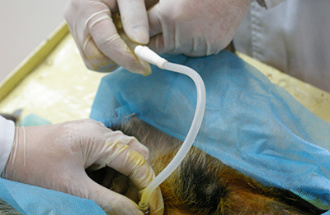 |
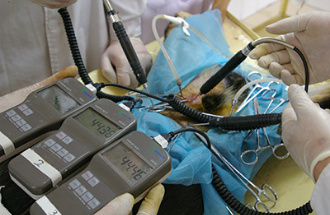 |
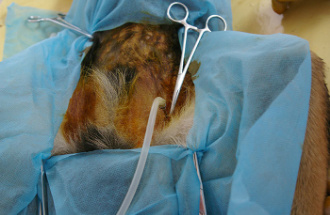 |
|
|
|
|
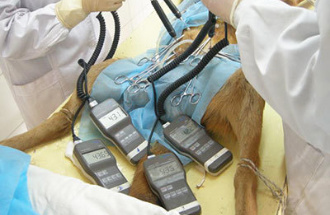 |
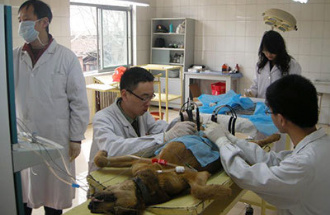 |
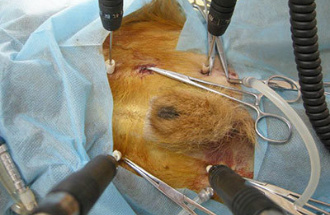 |
|
|
|
|
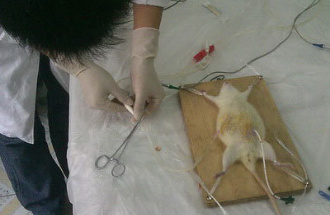 |
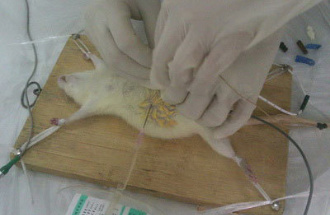 |
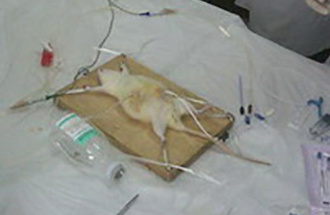 |
|
|
|
|

目的:探讨在不同温度下进行体腔恒温循环热灌注化疗(Coelom Continued Circulatory Hyperthermia Perfusion,CCCHP)对实验动物生命体征和腹腔各脏器的影响,以寻求找出治疗的最适温度和有效控温的途径。
方法:选用犬做实验动物,应用体腔循环灌注热化疗机建立CCCHP动物模型,分别用41℃(分为单纯生理盐水组和顺铂组),42℃(生理盐水组),43℃(生理盐水组)腹腔温度对每组动物CCCHP3次(临床治疗一个疗程),每次1h,间隔2d。记录犬的生命体征、测温计读数及热灌机面板的数据。在每次CCCHP前及每次CCCHP24h后抽取外周血备检。CCCHP3次后24h及2周时每组分别处死2只犬,开腹观察内脏器官的形态学改变,并切取肝、肾等脏器进行病理检查。
结果:41℃腹腔温度下3次CCCHP对犬的生命体征及肝肾功无明显影响,肝、肾、脾和肠组织损伤轻微;41℃腹腔温度联合顺铂3次CCCHP也未对犬的正常生理功能造成明显影响;42℃,43℃腹腔温度行3次CCCHP后均对犬的生命体征及肝肾功有不同程度的影响,肝、肾、脾及肠组织均有不同程度的损伤。
结论:41℃腹腔温度3次CCCHP,每次1.0h是安全可行的,可以作为CCCHP联合化疗的相对安全治疗温度;42℃同条件下会对犬腹腔重要脏器造成轻度损伤,不建议作为CCCHP常规治疗温度;43℃同条件下会对犬的正常生理功能造成严重损害,不适合作为CCCHP的治疗温度。
 |
 |
 |
|
|
|
|
 |
 |
 |
|
|
|
|
 |
 |
 |
|
|
|
|


